ECON 101: Economics for the Hospitality Industry Report
VerifiedAdded on 2020/04/15
|12
|2664
|131
Report
AI Summary
This report delves into the economics of the hospitality industry, exploring the impacts of all-inclusive vacations and cruise lines on local tourist industries, highlighting both the simplicity and convenience they offer while also examining the negative consequences. It also examines the potential downfalls of a nation's complete reliance on tourism, such as environmental damage, commercialization of culture, and job insecurity, alongside the positive contributions like employment, increased spending, and infrastructure development. The report further differentiates between mass tourism and alternative tourism, analyzing their characteristics and impacts on economic development, concluding that alternative tourism may be superior in promoting economic growth.
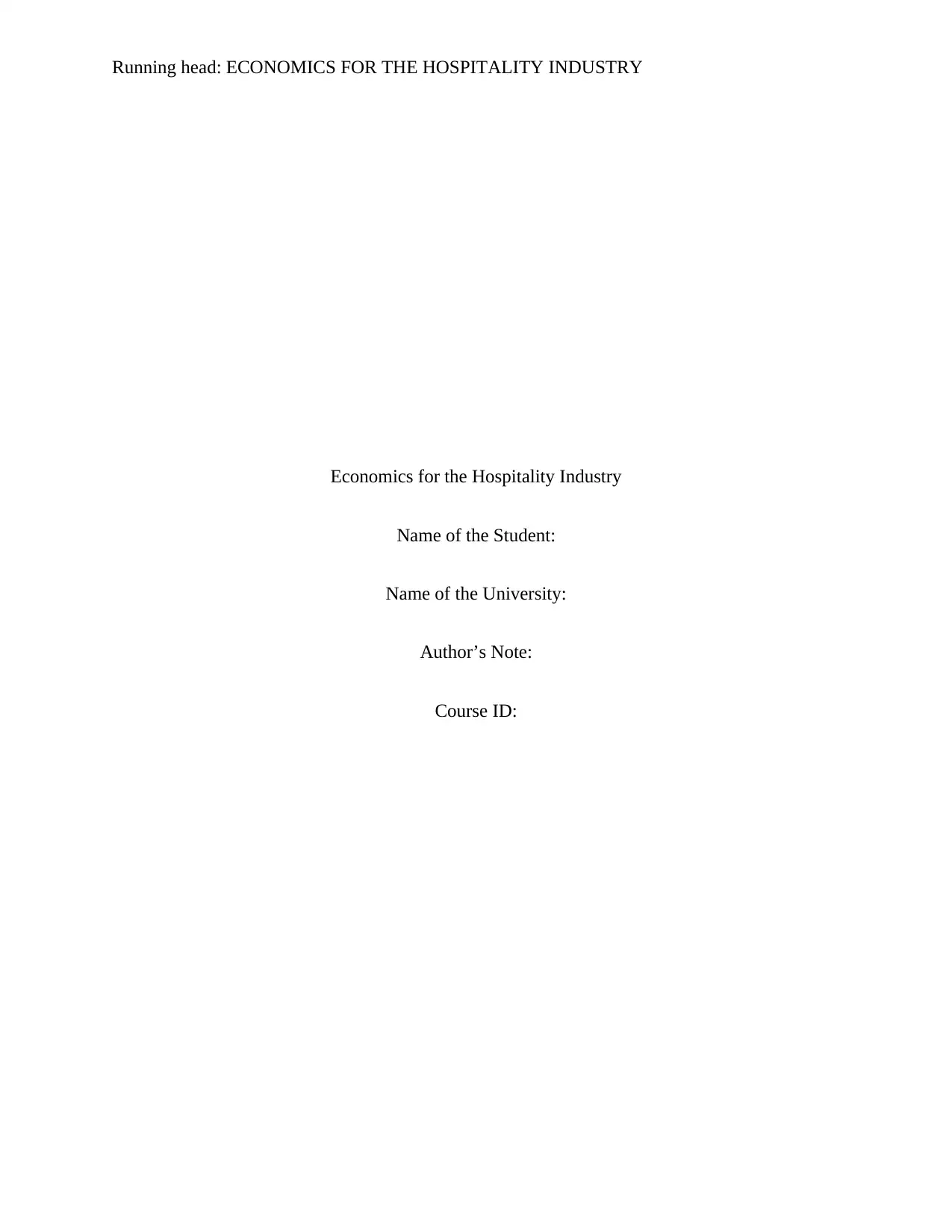
Running head: ECONOMICS FOR THE HOSPITALITY INDUSTRY
Economics for the Hospitality Industry
Name of the Student:
Name of the University:
Author’s Note:
Course ID:
Economics for the Hospitality Industry
Name of the Student:
Name of the University:
Author’s Note:
Course ID:
Paraphrase This Document
Need a fresh take? Get an instant paraphrase of this document with our AI Paraphraser
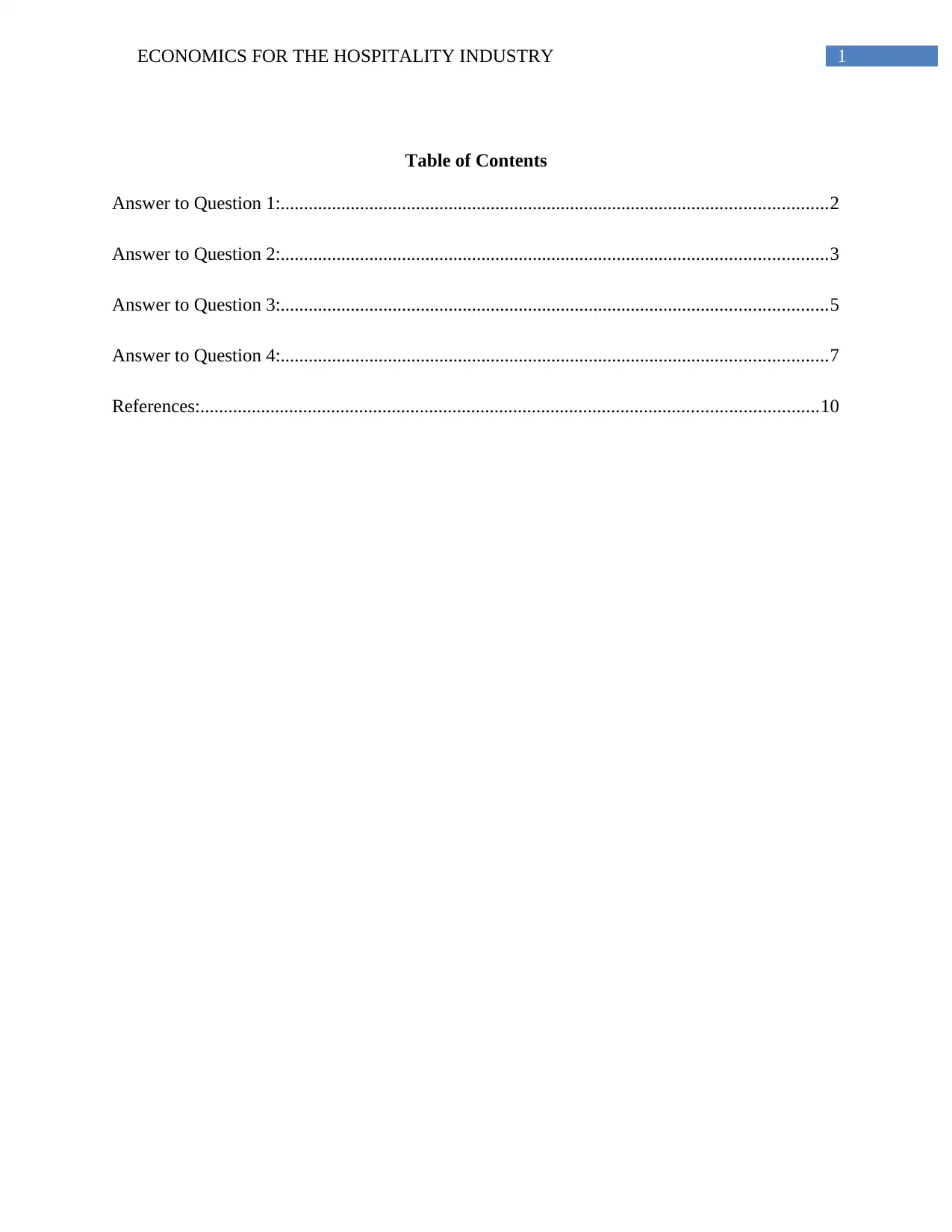
1ECONOMICS FOR THE HOSPITALITY INDUSTRY
Table of Contents
Answer to Question 1:.....................................................................................................................2
Answer to Question 2:.....................................................................................................................3
Answer to Question 3:.....................................................................................................................5
Answer to Question 4:.....................................................................................................................7
References:....................................................................................................................................10
Table of Contents
Answer to Question 1:.....................................................................................................................2
Answer to Question 2:.....................................................................................................................3
Answer to Question 3:.....................................................................................................................5
Answer to Question 4:.....................................................................................................................7
References:....................................................................................................................................10
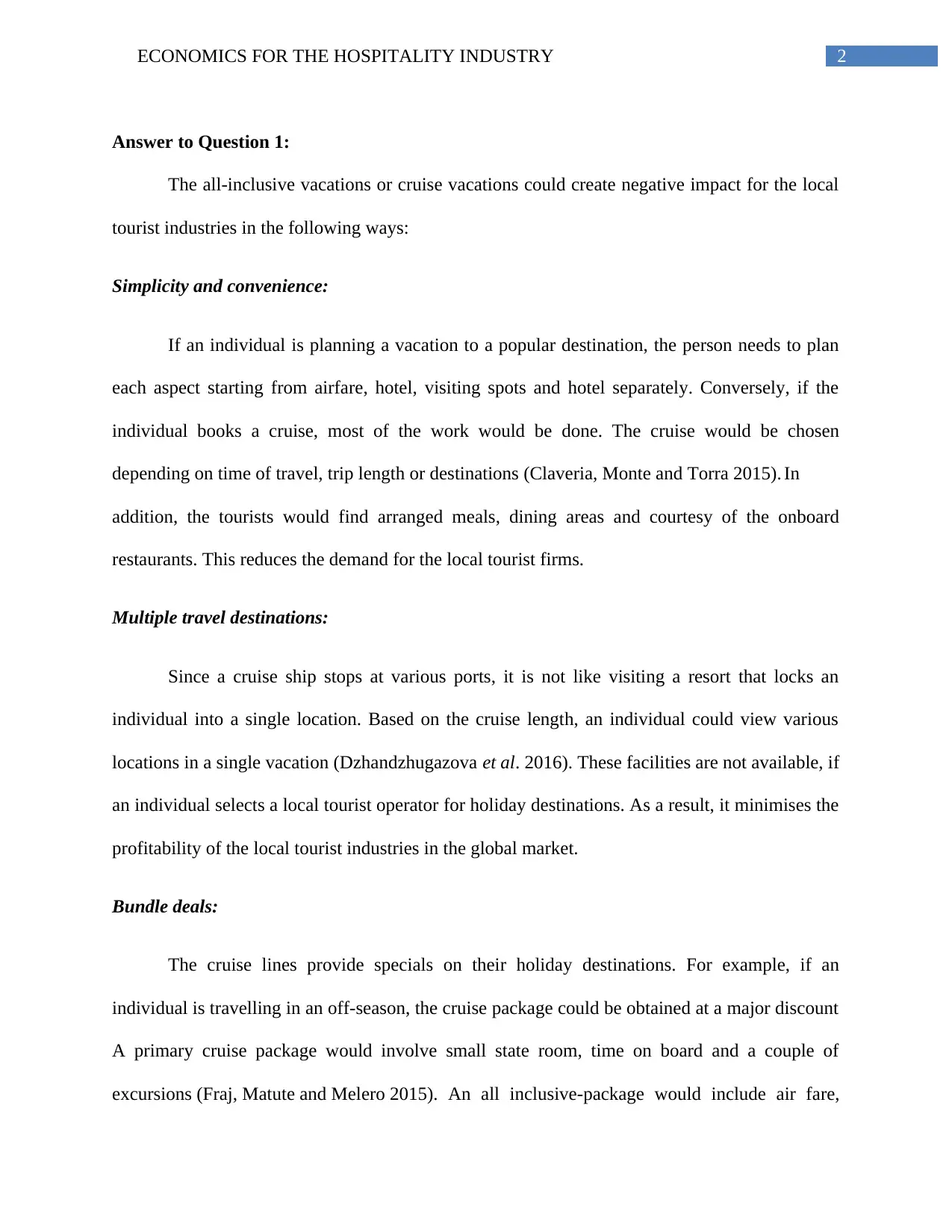
2ECONOMICS FOR THE HOSPITALITY INDUSTRY
Answer to Question 1:
The all-inclusive vacations or cruise vacations could create negative impact for the local
tourist industries in the following ways:
Simplicity and convenience:
If an individual is planning a vacation to a popular destination, the person needs to plan
each aspect starting from airfare, hotel, visiting spots and hotel separately. Conversely, if the
individual books a cruise, most of the work would be done. The cruise would be chosen
depending on time of travel, trip length or destinations (Claveria, Monte and Torra 2015). In
addition, the tourists would find arranged meals, dining areas and courtesy of the onboard
restaurants. This reduces the demand for the local tourist firms.
Multiple travel destinations:
Since a cruise ship stops at various ports, it is not like visiting a resort that locks an
individual into a single location. Based on the cruise length, an individual could view various
locations in a single vacation (Dzhandzhugazova et al. 2016). These facilities are not available, if
an individual selects a local tourist operator for holiday destinations. As a result, it minimises the
profitability of the local tourist industries in the global market.
Bundle deals:
The cruise lines provide specials on their holiday destinations. For example, if an
individual is travelling in an off-season, the cruise package could be obtained at a major discount
A primary cruise package would involve small state room, time on board and a couple of
excursions (Fraj, Matute and Melero 2015). An all inclusive-package would include air fare,
Answer to Question 1:
The all-inclusive vacations or cruise vacations could create negative impact for the local
tourist industries in the following ways:
Simplicity and convenience:
If an individual is planning a vacation to a popular destination, the person needs to plan
each aspect starting from airfare, hotel, visiting spots and hotel separately. Conversely, if the
individual books a cruise, most of the work would be done. The cruise would be chosen
depending on time of travel, trip length or destinations (Claveria, Monte and Torra 2015). In
addition, the tourists would find arranged meals, dining areas and courtesy of the onboard
restaurants. This reduces the demand for the local tourist firms.
Multiple travel destinations:
Since a cruise ship stops at various ports, it is not like visiting a resort that locks an
individual into a single location. Based on the cruise length, an individual could view various
locations in a single vacation (Dzhandzhugazova et al. 2016). These facilities are not available, if
an individual selects a local tourist operator for holiday destinations. As a result, it minimises the
profitability of the local tourist industries in the global market.
Bundle deals:
The cruise lines provide specials on their holiday destinations. For example, if an
individual is travelling in an off-season, the cruise package could be obtained at a major discount
A primary cruise package would involve small state room, time on board and a couple of
excursions (Fraj, Matute and Melero 2015). An all inclusive-package would include air fare,
⊘ This is a preview!⊘
Do you want full access?
Subscribe today to unlock all pages.

Trusted by 1+ million students worldwide
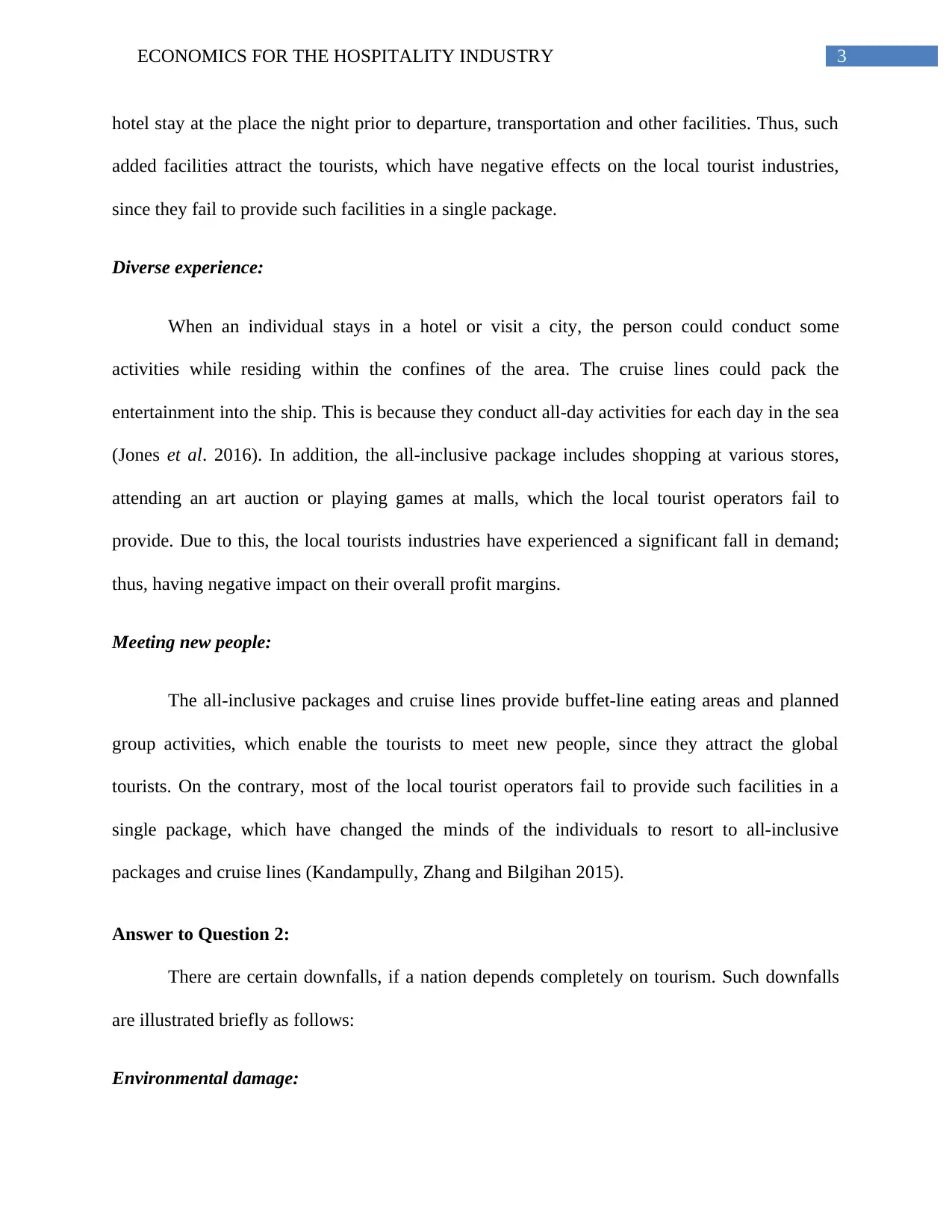
3ECONOMICS FOR THE HOSPITALITY INDUSTRY
hotel stay at the place the night prior to departure, transportation and other facilities. Thus, such
added facilities attract the tourists, which have negative effects on the local tourist industries,
since they fail to provide such facilities in a single package.
Diverse experience:
When an individual stays in a hotel or visit a city, the person could conduct some
activities while residing within the confines of the area. The cruise lines could pack the
entertainment into the ship. This is because they conduct all-day activities for each day in the sea
(Jones et al. 2016). In addition, the all-inclusive package includes shopping at various stores,
attending an art auction or playing games at malls, which the local tourist operators fail to
provide. Due to this, the local tourists industries have experienced a significant fall in demand;
thus, having negative impact on their overall profit margins.
Meeting new people:
The all-inclusive packages and cruise lines provide buffet-line eating areas and planned
group activities, which enable the tourists to meet new people, since they attract the global
tourists. On the contrary, most of the local tourist operators fail to provide such facilities in a
single package, which have changed the minds of the individuals to resort to all-inclusive
packages and cruise lines (Kandampully, Zhang and Bilgihan 2015).
Answer to Question 2:
There are certain downfalls, if a nation depends completely on tourism. Such downfalls
are illustrated briefly as follows:
Environmental damage:
hotel stay at the place the night prior to departure, transportation and other facilities. Thus, such
added facilities attract the tourists, which have negative effects on the local tourist industries,
since they fail to provide such facilities in a single package.
Diverse experience:
When an individual stays in a hotel or visit a city, the person could conduct some
activities while residing within the confines of the area. The cruise lines could pack the
entertainment into the ship. This is because they conduct all-day activities for each day in the sea
(Jones et al. 2016). In addition, the all-inclusive package includes shopping at various stores,
attending an art auction or playing games at malls, which the local tourist operators fail to
provide. Due to this, the local tourists industries have experienced a significant fall in demand;
thus, having negative impact on their overall profit margins.
Meeting new people:
The all-inclusive packages and cruise lines provide buffet-line eating areas and planned
group activities, which enable the tourists to meet new people, since they attract the global
tourists. On the contrary, most of the local tourist operators fail to provide such facilities in a
single package, which have changed the minds of the individuals to resort to all-inclusive
packages and cruise lines (Kandampully, Zhang and Bilgihan 2015).
Answer to Question 2:
There are certain downfalls, if a nation depends completely on tourism. Such downfalls
are illustrated briefly as follows:
Environmental damage:
Paraphrase This Document
Need a fresh take? Get an instant paraphrase of this document with our AI Paraphraser
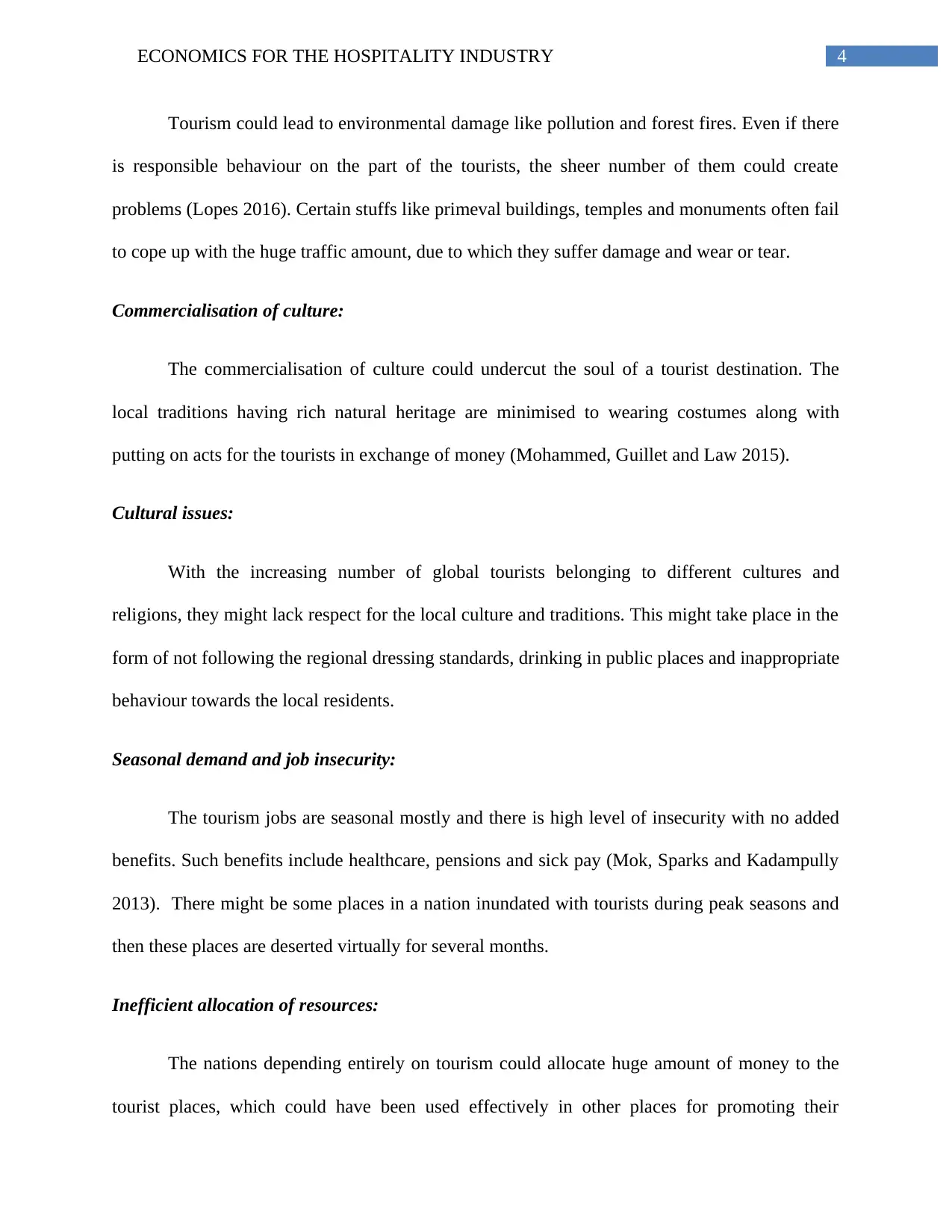
4ECONOMICS FOR THE HOSPITALITY INDUSTRY
Tourism could lead to environmental damage like pollution and forest fires. Even if there
is responsible behaviour on the part of the tourists, the sheer number of them could create
problems (Lopes 2016). Certain stuffs like primeval buildings, temples and monuments often fail
to cope up with the huge traffic amount, due to which they suffer damage and wear or tear.
Commercialisation of culture:
The commercialisation of culture could undercut the soul of a tourist destination. The
local traditions having rich natural heritage are minimised to wearing costumes along with
putting on acts for the tourists in exchange of money (Mohammed, Guillet and Law 2015).
Cultural issues:
With the increasing number of global tourists belonging to different cultures and
religions, they might lack respect for the local culture and traditions. This might take place in the
form of not following the regional dressing standards, drinking in public places and inappropriate
behaviour towards the local residents.
Seasonal demand and job insecurity:
The tourism jobs are seasonal mostly and there is high level of insecurity with no added
benefits. Such benefits include healthcare, pensions and sick pay (Mok, Sparks and Kadampully
2013). There might be some places in a nation inundated with tourists during peak seasons and
then these places are deserted virtually for several months.
Inefficient allocation of resources:
The nations depending entirely on tourism could allocate huge amount of money to the
tourist places, which could have been used effectively in other places for promoting their
Tourism could lead to environmental damage like pollution and forest fires. Even if there
is responsible behaviour on the part of the tourists, the sheer number of them could create
problems (Lopes 2016). Certain stuffs like primeval buildings, temples and monuments often fail
to cope up with the huge traffic amount, due to which they suffer damage and wear or tear.
Commercialisation of culture:
The commercialisation of culture could undercut the soul of a tourist destination. The
local traditions having rich natural heritage are minimised to wearing costumes along with
putting on acts for the tourists in exchange of money (Mohammed, Guillet and Law 2015).
Cultural issues:
With the increasing number of global tourists belonging to different cultures and
religions, they might lack respect for the local culture and traditions. This might take place in the
form of not following the regional dressing standards, drinking in public places and inappropriate
behaviour towards the local residents.
Seasonal demand and job insecurity:
The tourism jobs are seasonal mostly and there is high level of insecurity with no added
benefits. Such benefits include healthcare, pensions and sick pay (Mok, Sparks and Kadampully
2013). There might be some places in a nation inundated with tourists during peak seasons and
then these places are deserted virtually for several months.
Inefficient allocation of resources:
The nations depending entirely on tourism could allocate huge amount of money to the
tourist places, which could have been used effectively in other places for promoting their
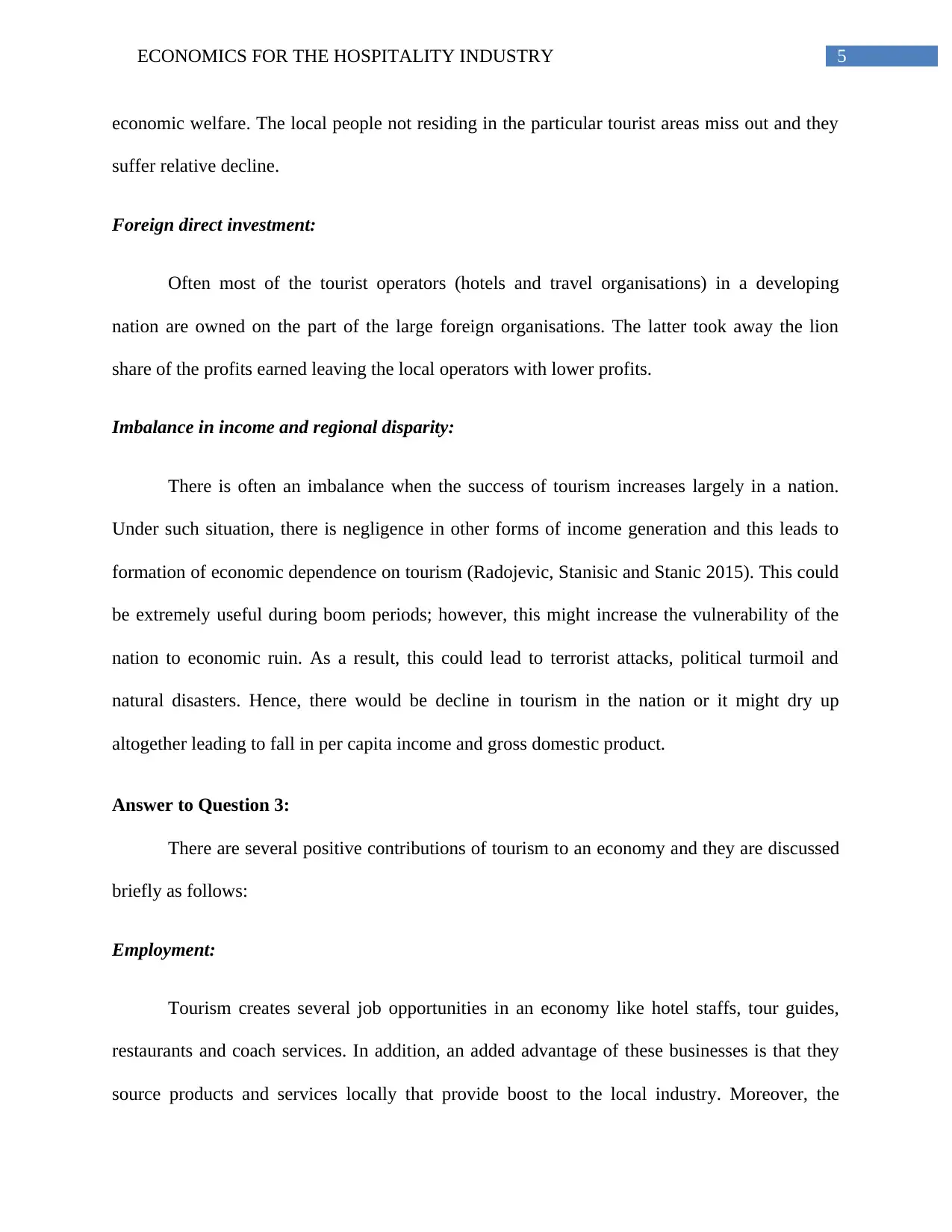
5ECONOMICS FOR THE HOSPITALITY INDUSTRY
economic welfare. The local people not residing in the particular tourist areas miss out and they
suffer relative decline.
Foreign direct investment:
Often most of the tourist operators (hotels and travel organisations) in a developing
nation are owned on the part of the large foreign organisations. The latter took away the lion
share of the profits earned leaving the local operators with lower profits.
Imbalance in income and regional disparity:
There is often an imbalance when the success of tourism increases largely in a nation.
Under such situation, there is negligence in other forms of income generation and this leads to
formation of economic dependence on tourism (Radojevic, Stanisic and Stanic 2015). This could
be extremely useful during boom periods; however, this might increase the vulnerability of the
nation to economic ruin. As a result, this could lead to terrorist attacks, political turmoil and
natural disasters. Hence, there would be decline in tourism in the nation or it might dry up
altogether leading to fall in per capita income and gross domestic product.
Answer to Question 3:
There are several positive contributions of tourism to an economy and they are discussed
briefly as follows:
Employment:
Tourism creates several job opportunities in an economy like hotel staffs, tour guides,
restaurants and coach services. In addition, an added advantage of these businesses is that they
source products and services locally that provide boost to the local industry. Moreover, the
economic welfare. The local people not residing in the particular tourist areas miss out and they
suffer relative decline.
Foreign direct investment:
Often most of the tourist operators (hotels and travel organisations) in a developing
nation are owned on the part of the large foreign organisations. The latter took away the lion
share of the profits earned leaving the local operators with lower profits.
Imbalance in income and regional disparity:
There is often an imbalance when the success of tourism increases largely in a nation.
Under such situation, there is negligence in other forms of income generation and this leads to
formation of economic dependence on tourism (Radojevic, Stanisic and Stanic 2015). This could
be extremely useful during boom periods; however, this might increase the vulnerability of the
nation to economic ruin. As a result, this could lead to terrorist attacks, political turmoil and
natural disasters. Hence, there would be decline in tourism in the nation or it might dry up
altogether leading to fall in per capita income and gross domestic product.
Answer to Question 3:
There are several positive contributions of tourism to an economy and they are discussed
briefly as follows:
Employment:
Tourism creates several job opportunities in an economy like hotel staffs, tour guides,
restaurants and coach services. In addition, an added advantage of these businesses is that they
source products and services locally that provide boost to the local industry. Moreover, the
⊘ This is a preview!⊘
Do you want full access?
Subscribe today to unlock all pages.

Trusted by 1+ million students worldwide
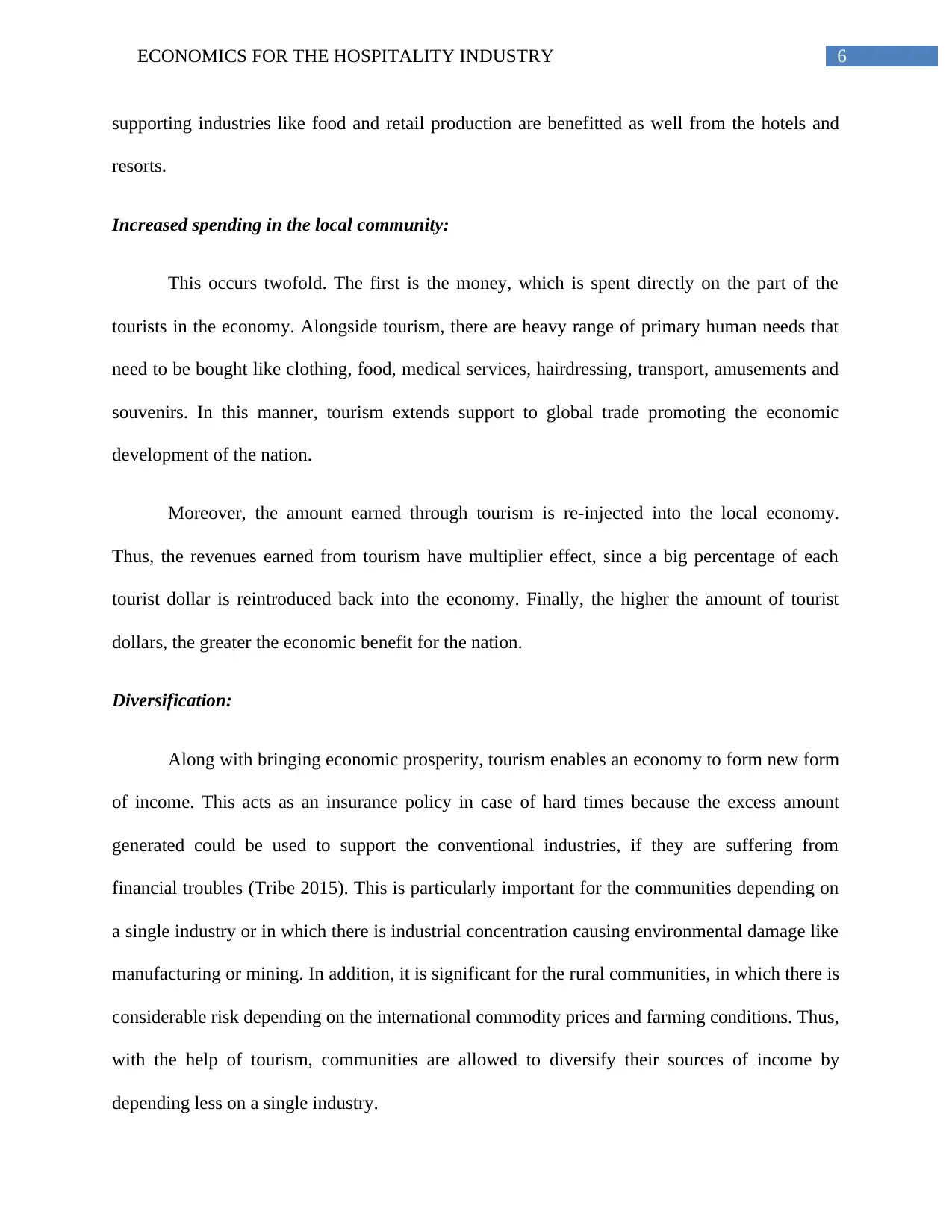
6ECONOMICS FOR THE HOSPITALITY INDUSTRY
supporting industries like food and retail production are benefitted as well from the hotels and
resorts.
Increased spending in the local community:
This occurs twofold. The first is the money, which is spent directly on the part of the
tourists in the economy. Alongside tourism, there are heavy range of primary human needs that
need to be bought like clothing, food, medical services, hairdressing, transport, amusements and
souvenirs. In this manner, tourism extends support to global trade promoting the economic
development of the nation.
Moreover, the amount earned through tourism is re-injected into the local economy.
Thus, the revenues earned from tourism have multiplier effect, since a big percentage of each
tourist dollar is reintroduced back into the economy. Finally, the higher the amount of tourist
dollars, the greater the economic benefit for the nation.
Diversification:
Along with bringing economic prosperity, tourism enables an economy to form new form
of income. This acts as an insurance policy in case of hard times because the excess amount
generated could be used to support the conventional industries, if they are suffering from
financial troubles (Tribe 2015). This is particularly important for the communities depending on
a single industry or in which there is industrial concentration causing environmental damage like
manufacturing or mining. In addition, it is significant for the rural communities, in which there is
considerable risk depending on the international commodity prices and farming conditions. Thus,
with the help of tourism, communities are allowed to diversify their sources of income by
depending less on a single industry.
supporting industries like food and retail production are benefitted as well from the hotels and
resorts.
Increased spending in the local community:
This occurs twofold. The first is the money, which is spent directly on the part of the
tourists in the economy. Alongside tourism, there are heavy range of primary human needs that
need to be bought like clothing, food, medical services, hairdressing, transport, amusements and
souvenirs. In this manner, tourism extends support to global trade promoting the economic
development of the nation.
Moreover, the amount earned through tourism is re-injected into the local economy.
Thus, the revenues earned from tourism have multiplier effect, since a big percentage of each
tourist dollar is reintroduced back into the economy. Finally, the higher the amount of tourist
dollars, the greater the economic benefit for the nation.
Diversification:
Along with bringing economic prosperity, tourism enables an economy to form new form
of income. This acts as an insurance policy in case of hard times because the excess amount
generated could be used to support the conventional industries, if they are suffering from
financial troubles (Tribe 2015). This is particularly important for the communities depending on
a single industry or in which there is industrial concentration causing environmental damage like
manufacturing or mining. In addition, it is significant for the rural communities, in which there is
considerable risk depending on the international commodity prices and farming conditions. Thus,
with the help of tourism, communities are allowed to diversify their sources of income by
depending less on a single industry.
Paraphrase This Document
Need a fresh take? Get an instant paraphrase of this document with our AI Paraphraser
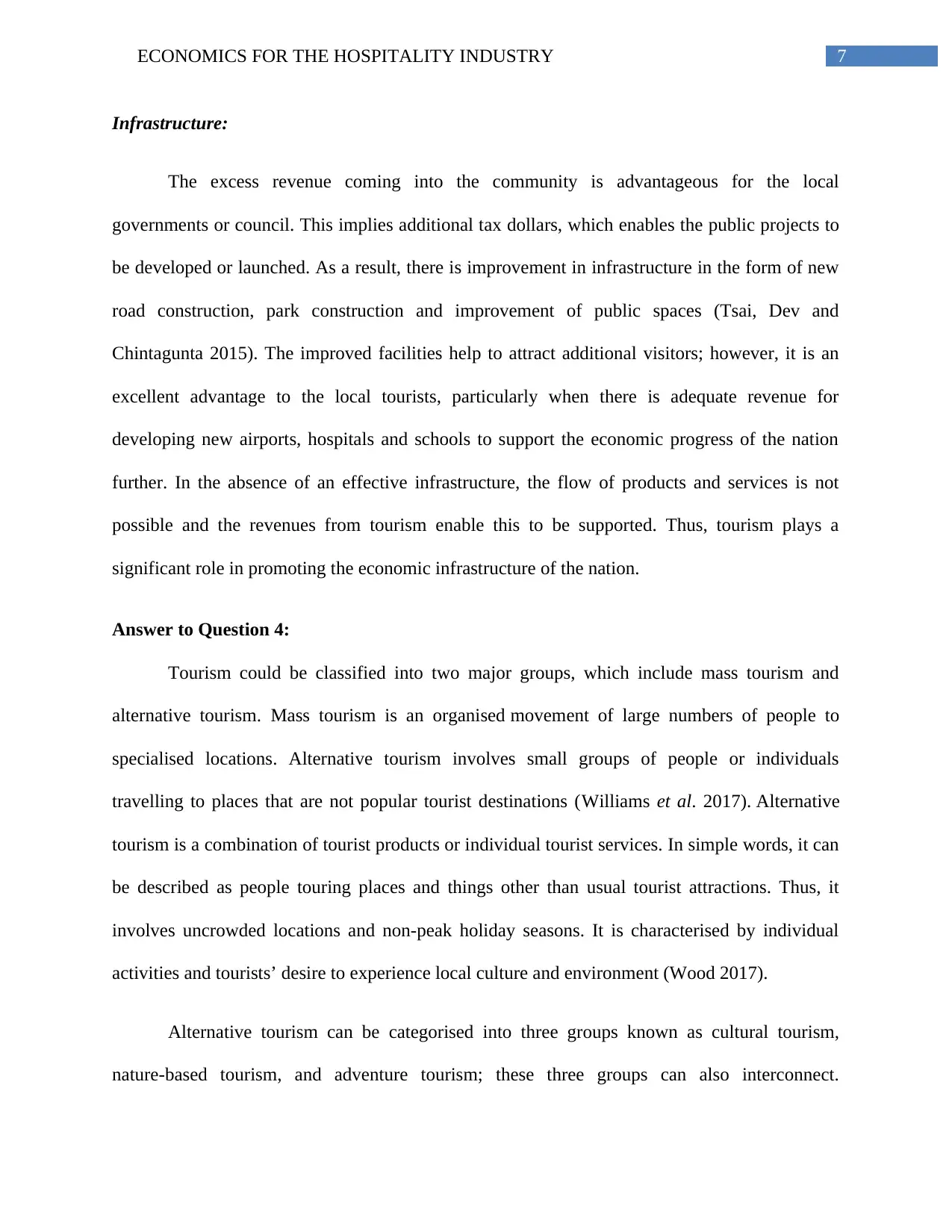
7ECONOMICS FOR THE HOSPITALITY INDUSTRY
Infrastructure:
The excess revenue coming into the community is advantageous for the local
governments or council. This implies additional tax dollars, which enables the public projects to
be developed or launched. As a result, there is improvement in infrastructure in the form of new
road construction, park construction and improvement of public spaces (Tsai, Dev and
Chintagunta 2015). The improved facilities help to attract additional visitors; however, it is an
excellent advantage to the local tourists, particularly when there is adequate revenue for
developing new airports, hospitals and schools to support the economic progress of the nation
further. In the absence of an effective infrastructure, the flow of products and services is not
possible and the revenues from tourism enable this to be supported. Thus, tourism plays a
significant role in promoting the economic infrastructure of the nation.
Answer to Question 4:
Tourism could be classified into two major groups, which include mass tourism and
alternative tourism. Mass tourism is an organised movement of large numbers of people to
specialised locations. Alternative tourism involves small groups of people or individuals
travelling to places that are not popular tourist destinations (Williams et al. 2017). Alternative
tourism is a combination of tourist products or individual tourist services. In simple words, it can
be described as people touring places and things other than usual tourist attractions. Thus, it
involves uncrowded locations and non-peak holiday seasons. It is characterised by individual
activities and tourists’ desire to experience local culture and environment (Wood 2017).
Alternative tourism can be categorised into three groups known as cultural tourism,
nature-based tourism, and adventure tourism; these three groups can also interconnect.
Infrastructure:
The excess revenue coming into the community is advantageous for the local
governments or council. This implies additional tax dollars, which enables the public projects to
be developed or launched. As a result, there is improvement in infrastructure in the form of new
road construction, park construction and improvement of public spaces (Tsai, Dev and
Chintagunta 2015). The improved facilities help to attract additional visitors; however, it is an
excellent advantage to the local tourists, particularly when there is adequate revenue for
developing new airports, hospitals and schools to support the economic progress of the nation
further. In the absence of an effective infrastructure, the flow of products and services is not
possible and the revenues from tourism enable this to be supported. Thus, tourism plays a
significant role in promoting the economic infrastructure of the nation.
Answer to Question 4:
Tourism could be classified into two major groups, which include mass tourism and
alternative tourism. Mass tourism is an organised movement of large numbers of people to
specialised locations. Alternative tourism involves small groups of people or individuals
travelling to places that are not popular tourist destinations (Williams et al. 2017). Alternative
tourism is a combination of tourist products or individual tourist services. In simple words, it can
be described as people touring places and things other than usual tourist attractions. Thus, it
involves uncrowded locations and non-peak holiday seasons. It is characterised by individual
activities and tourists’ desire to experience local culture and environment (Wood 2017).
Alternative tourism can be categorised into three groups known as cultural tourism,
nature-based tourism, and adventure tourism; these three groups can also interconnect.
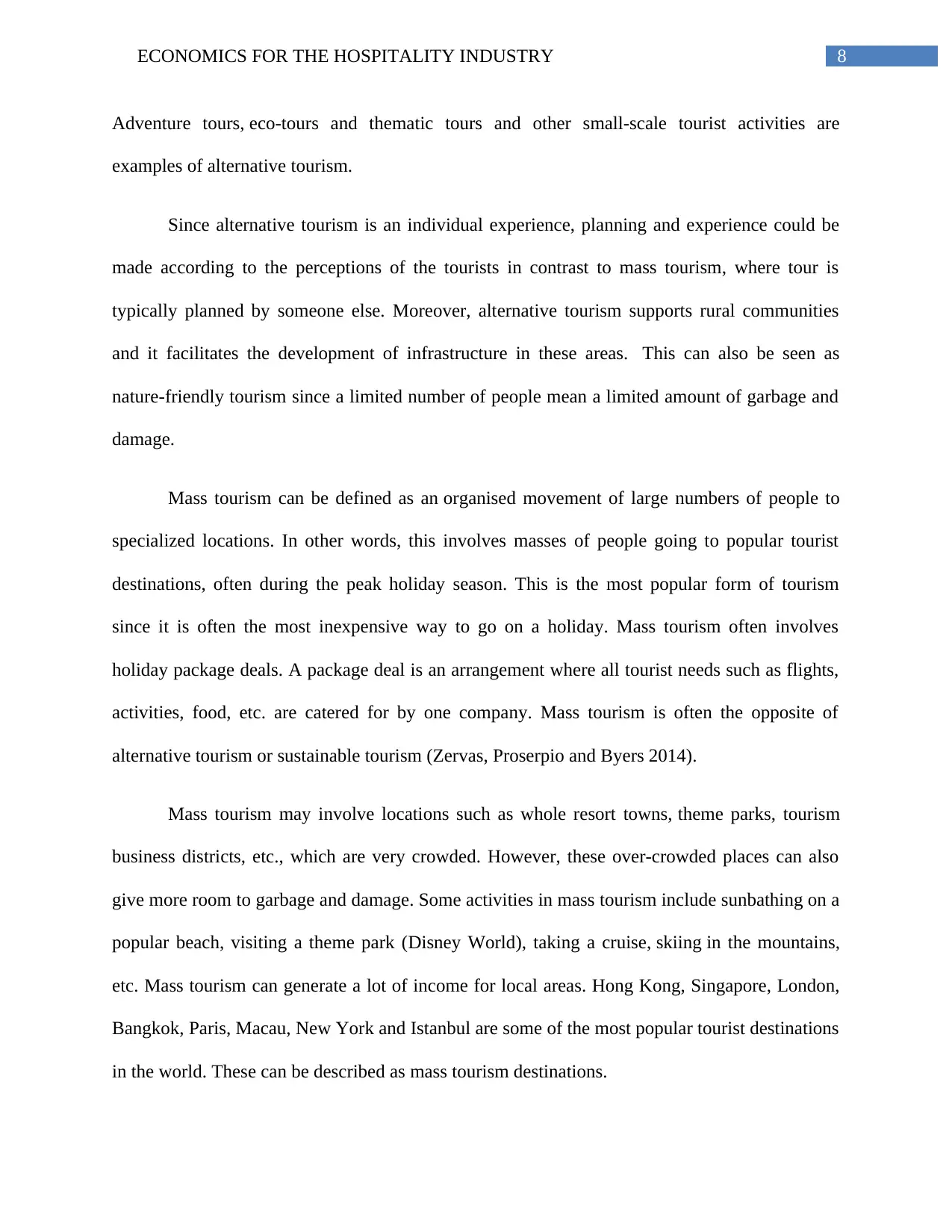
8ECONOMICS FOR THE HOSPITALITY INDUSTRY
Adventure tours, eco-tours and thematic tours and other small-scale tourist activities are
examples of alternative tourism.
Since alternative tourism is an individual experience, planning and experience could be
made according to the perceptions of the tourists in contrast to mass tourism, where tour is
typically planned by someone else. Moreover, alternative tourism supports rural communities
and it facilitates the development of infrastructure in these areas. This can also be seen as
nature-friendly tourism since a limited number of people mean a limited amount of garbage and
damage.
Mass tourism can be defined as an organised movement of large numbers of people to
specialized locations. In other words, this involves masses of people going to popular tourist
destinations, often during the peak holiday season. This is the most popular form of tourism
since it is often the most inexpensive way to go on a holiday. Mass tourism often involves
holiday package deals. A package deal is an arrangement where all tourist needs such as flights,
activities, food, etc. are catered for by one company. Mass tourism is often the opposite of
alternative tourism or sustainable tourism (Zervas, Proserpio and Byers 2014).
Mass tourism may involve locations such as whole resort towns, theme parks, tourism
business districts, etc., which are very crowded. However, these over-crowded places can also
give more room to garbage and damage. Some activities in mass tourism include sunbathing on a
popular beach, visiting a theme park (Disney World), taking a cruise, skiing in the mountains,
etc. Mass tourism can generate a lot of income for local areas. Hong Kong, Singapore, London,
Bangkok, Paris, Macau, New York and Istanbul are some of the most popular tourist destinations
in the world. These can be described as mass tourism destinations.
Adventure tours, eco-tours and thematic tours and other small-scale tourist activities are
examples of alternative tourism.
Since alternative tourism is an individual experience, planning and experience could be
made according to the perceptions of the tourists in contrast to mass tourism, where tour is
typically planned by someone else. Moreover, alternative tourism supports rural communities
and it facilitates the development of infrastructure in these areas. This can also be seen as
nature-friendly tourism since a limited number of people mean a limited amount of garbage and
damage.
Mass tourism can be defined as an organised movement of large numbers of people to
specialized locations. In other words, this involves masses of people going to popular tourist
destinations, often during the peak holiday season. This is the most popular form of tourism
since it is often the most inexpensive way to go on a holiday. Mass tourism often involves
holiday package deals. A package deal is an arrangement where all tourist needs such as flights,
activities, food, etc. are catered for by one company. Mass tourism is often the opposite of
alternative tourism or sustainable tourism (Zervas, Proserpio and Byers 2014).
Mass tourism may involve locations such as whole resort towns, theme parks, tourism
business districts, etc., which are very crowded. However, these over-crowded places can also
give more room to garbage and damage. Some activities in mass tourism include sunbathing on a
popular beach, visiting a theme park (Disney World), taking a cruise, skiing in the mountains,
etc. Mass tourism can generate a lot of income for local areas. Hong Kong, Singapore, London,
Bangkok, Paris, Macau, New York and Istanbul are some of the most popular tourist destinations
in the world. These can be described as mass tourism destinations.
⊘ This is a preview!⊘
Do you want full access?
Subscribe today to unlock all pages.

Trusted by 1+ million students worldwide

9ECONOMICS FOR THE HOSPITALITY INDUSTRY
Hence, based on the above evaluation, it could be inferred that alternative tourism is
superior compared to mass tourism to promote the economic development of the nation.
Hence, based on the above evaluation, it could be inferred that alternative tourism is
superior compared to mass tourism to promote the economic development of the nation.
Paraphrase This Document
Need a fresh take? Get an instant paraphrase of this document with our AI Paraphraser
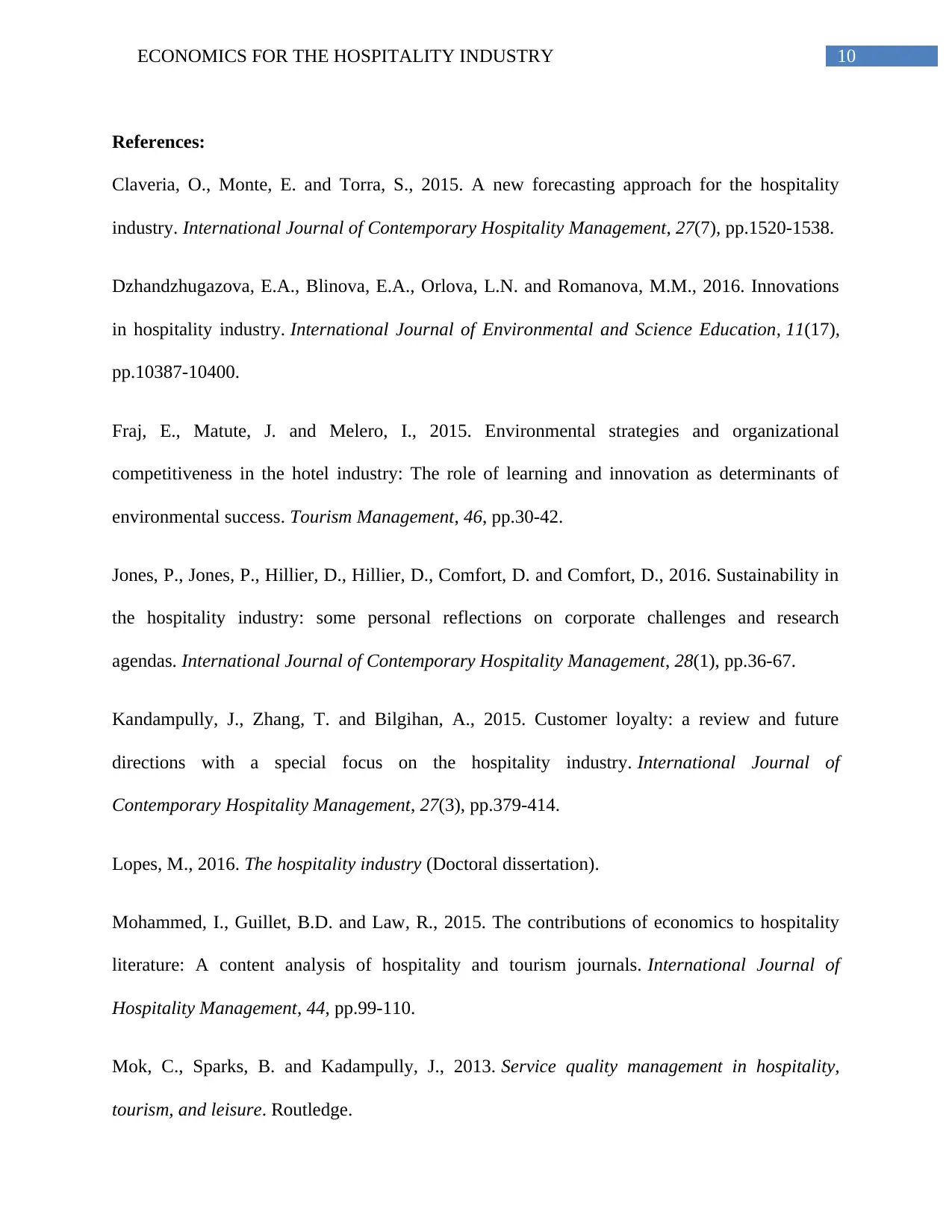
10ECONOMICS FOR THE HOSPITALITY INDUSTRY
References:
Claveria, O., Monte, E. and Torra, S., 2015. A new forecasting approach for the hospitality
industry. International Journal of Contemporary Hospitality Management, 27(7), pp.1520-1538.
Dzhandzhugazova, E.A., Blinova, E.A., Orlova, L.N. and Romanova, M.M., 2016. Innovations
in hospitality industry. International Journal of Environmental and Science Education, 11(17),
pp.10387-10400.
Fraj, E., Matute, J. and Melero, I., 2015. Environmental strategies and organizational
competitiveness in the hotel industry: The role of learning and innovation as determinants of
environmental success. Tourism Management, 46, pp.30-42.
Jones, P., Jones, P., Hillier, D., Hillier, D., Comfort, D. and Comfort, D., 2016. Sustainability in
the hospitality industry: some personal reflections on corporate challenges and research
agendas. International Journal of Contemporary Hospitality Management, 28(1), pp.36-67.
Kandampully, J., Zhang, T. and Bilgihan, A., 2015. Customer loyalty: a review and future
directions with a special focus on the hospitality industry. International Journal of
Contemporary Hospitality Management, 27(3), pp.379-414.
Lopes, M., 2016. The hospitality industry (Doctoral dissertation).
Mohammed, I., Guillet, B.D. and Law, R., 2015. The contributions of economics to hospitality
literature: A content analysis of hospitality and tourism journals. International Journal of
Hospitality Management, 44, pp.99-110.
Mok, C., Sparks, B. and Kadampully, J., 2013. Service quality management in hospitality,
tourism, and leisure. Routledge.
References:
Claveria, O., Monte, E. and Torra, S., 2015. A new forecasting approach for the hospitality
industry. International Journal of Contemporary Hospitality Management, 27(7), pp.1520-1538.
Dzhandzhugazova, E.A., Blinova, E.A., Orlova, L.N. and Romanova, M.M., 2016. Innovations
in hospitality industry. International Journal of Environmental and Science Education, 11(17),
pp.10387-10400.
Fraj, E., Matute, J. and Melero, I., 2015. Environmental strategies and organizational
competitiveness in the hotel industry: The role of learning and innovation as determinants of
environmental success. Tourism Management, 46, pp.30-42.
Jones, P., Jones, P., Hillier, D., Hillier, D., Comfort, D. and Comfort, D., 2016. Sustainability in
the hospitality industry: some personal reflections on corporate challenges and research
agendas. International Journal of Contemporary Hospitality Management, 28(1), pp.36-67.
Kandampully, J., Zhang, T. and Bilgihan, A., 2015. Customer loyalty: a review and future
directions with a special focus on the hospitality industry. International Journal of
Contemporary Hospitality Management, 27(3), pp.379-414.
Lopes, M., 2016. The hospitality industry (Doctoral dissertation).
Mohammed, I., Guillet, B.D. and Law, R., 2015. The contributions of economics to hospitality
literature: A content analysis of hospitality and tourism journals. International Journal of
Hospitality Management, 44, pp.99-110.
Mok, C., Sparks, B. and Kadampully, J., 2013. Service quality management in hospitality,
tourism, and leisure. Routledge.
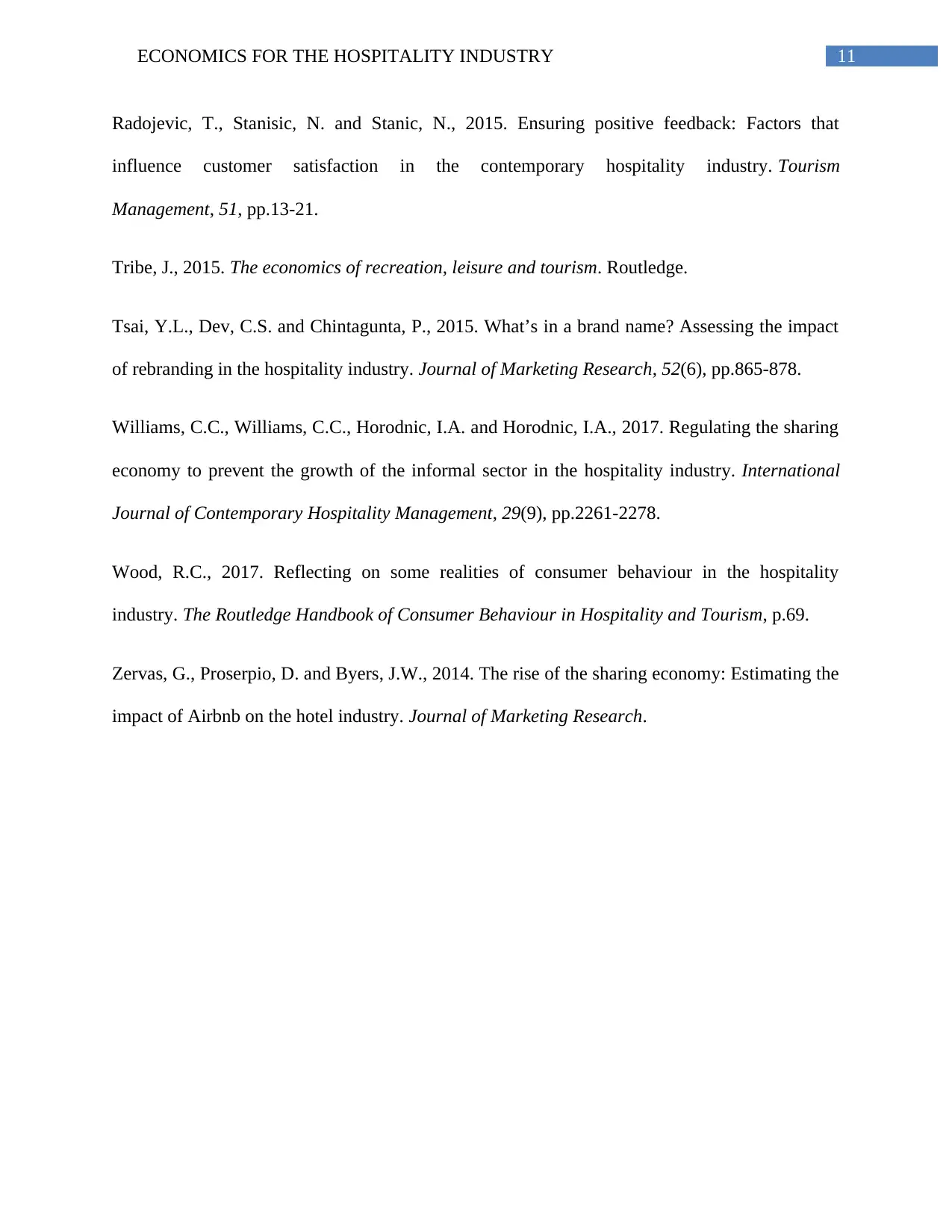
11ECONOMICS FOR THE HOSPITALITY INDUSTRY
Radojevic, T., Stanisic, N. and Stanic, N., 2015. Ensuring positive feedback: Factors that
influence customer satisfaction in the contemporary hospitality industry. Tourism
Management, 51, pp.13-21.
Tribe, J., 2015. The economics of recreation, leisure and tourism. Routledge.
Tsai, Y.L., Dev, C.S. and Chintagunta, P., 2015. What’s in a brand name? Assessing the impact
of rebranding in the hospitality industry. Journal of Marketing Research, 52(6), pp.865-878.
Williams, C.C., Williams, C.C., Horodnic, I.A. and Horodnic, I.A., 2017. Regulating the sharing
economy to prevent the growth of the informal sector in the hospitality industry. International
Journal of Contemporary Hospitality Management, 29(9), pp.2261-2278.
Wood, R.C., 2017. Reflecting on some realities of consumer behaviour in the hospitality
industry. The Routledge Handbook of Consumer Behaviour in Hospitality and Tourism, p.69.
Zervas, G., Proserpio, D. and Byers, J.W., 2014. The rise of the sharing economy: Estimating the
impact of Airbnb on the hotel industry. Journal of Marketing Research.
Radojevic, T., Stanisic, N. and Stanic, N., 2015. Ensuring positive feedback: Factors that
influence customer satisfaction in the contemporary hospitality industry. Tourism
Management, 51, pp.13-21.
Tribe, J., 2015. The economics of recreation, leisure and tourism. Routledge.
Tsai, Y.L., Dev, C.S. and Chintagunta, P., 2015. What’s in a brand name? Assessing the impact
of rebranding in the hospitality industry. Journal of Marketing Research, 52(6), pp.865-878.
Williams, C.C., Williams, C.C., Horodnic, I.A. and Horodnic, I.A., 2017. Regulating the sharing
economy to prevent the growth of the informal sector in the hospitality industry. International
Journal of Contemporary Hospitality Management, 29(9), pp.2261-2278.
Wood, R.C., 2017. Reflecting on some realities of consumer behaviour in the hospitality
industry. The Routledge Handbook of Consumer Behaviour in Hospitality and Tourism, p.69.
Zervas, G., Proserpio, D. and Byers, J.W., 2014. The rise of the sharing economy: Estimating the
impact of Airbnb on the hotel industry. Journal of Marketing Research.
⊘ This is a preview!⊘
Do you want full access?
Subscribe today to unlock all pages.

Trusted by 1+ million students worldwide
1 out of 12
Related Documents
Your All-in-One AI-Powered Toolkit for Academic Success.
+13062052269
info@desklib.com
Available 24*7 on WhatsApp / Email
![[object Object]](/_next/static/media/star-bottom.7253800d.svg)
Unlock your academic potential
Copyright © 2020–2026 A2Z Services. All Rights Reserved. Developed and managed by ZUCOL.





